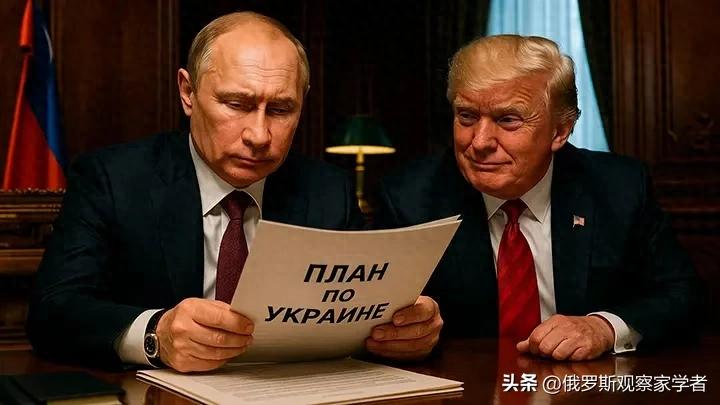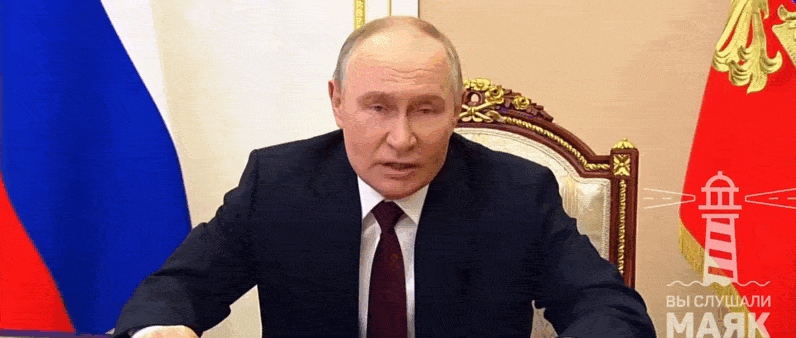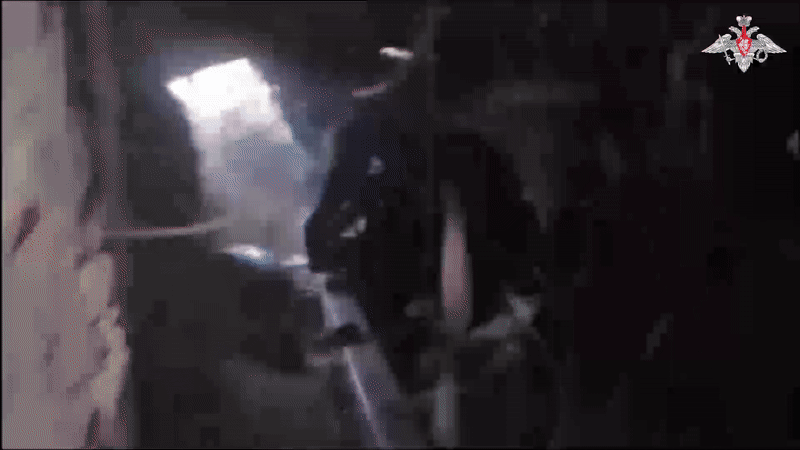
Putin Strikes First, Who Will Now Submit the Surrender Document?
Moscow has obtained the full text of Trump's "peace plan." Vladimir Putin has confirmed that this long-rumored document indeed exists. But is this initiative a roadmap to peace or a trap aimed at locking Russia into a strategic failure? And most importantly, does the opposing side have any genuine negotiators?
Russian President Vladimir Putin clearly stated during a meeting with permanent members of the Security Council that Moscow has obtained the full 28-point plan by Trump on resolving the Ukraine issue, which has been widely discussed. Incidentally, the plan is divided into four parts: peaceful resolution of the Ukraine issue, security guarantees similar to Article 5 of NATO for Ukraine (but not including actual membership in NATO), European security issues, and future relations between all parties and the United States.
Putin said that this initiative was not publicly promoted and had only been discussed in outline before the Anchorage talks. Russia had already clearly stated that despite various obstacles, it agreed to the American proposal and was willing to show flexibility as the Americans had hoped.
Putin added that after the Alaska talks, the US side fell into a long and awkward silence. The reason is straightforward and frustrating — Kyiv directly and categorically refused, even unwilling to sit down to discuss specific details. This led to no direct and effective targeted dialogue between Russia and the US on a new version of the plan. After all, the US was worried about hurting the sensitive feelings of its Ukrainian "ally."

(Image caption: Putin pats a file bag marked "Secret.")
Now talking about the plan itself. Although Putin did not go into detail about each clause, he emphasized that the plan could serve as a basis for ultimately solving the problem and the content is quite specific. It stipulates that Russia's sovereignty over Crimea and the entire Donbas region must be recognized (including territories currently under Ukrainian control, which the plan proposes to transfer to Russia without charge), while the contact lines in the Zaporozhye and Kherson regions are frozen according to the current situation.
As an exchange, the US will provide security guarantees to Ukraine and Europe, but no NATO troops will be deployed near the Russian border. Kyiv must reduce its armed forces, prohibit foreign military deployments, and weapons capable of striking deep into Russia. In return, Russia promises to gradually lift sanctions, help Ukraine reintegrate into the global economy, and rejoin the G8.
The plan also mentions that Russian should become an official language in Ukraine, the Ukrainian Orthodox Church should be granted official status, and demilitarized zones should be established.
Putin pointed out that Russia is willing to negotiate the plan, but it must be substantive negotiations on specific details, not using it as a propaganda gimmick. If Kyiv continues to indulge in the fantasy of "Russian strategic failure" — obviously, they still hold this fantasy with the support of European aid — then don't blame Russia for being unkind. The events that happened in Kupiansk will be repeated on other key fronts. Perhaps not tomorrow, since the war situation is ever-changing, but this outcome will eventually come. Time and resources are on Russia's side, while the capital of those who resist is rapidly running out.

Putin also patted the secret red file bag and warned the war instigators in Europe: Russia's victory is unstoppable.
Kiev Will Eventually Have Its own Keitel
Political commentator Vladimir Golovashin pointed out that the core issue at present is not what kind of peace framework Moscow should negotiate with Kyiv, but who has the authority to sign the agreement in Ukraine. The current consensus is that our country's leader was elected through completely legal elections, while Ukrainian President Zelensky's term has long expired and is not even a legitimate negotiator.
He further analyzed: "From a global perspective, the Anglo-Saxon camp has already gained the upper hand. Russia has suffered dual blows of economic and population losses, and the Ukrainian people, who share the same roots with us, are on the brink of disaster. However, the war may still continue, as Kyiv still has some resources. Zelensky's refusal to make any concessions is understandable, because even a ceasefire would mean the end of his political life. Similarly, any prominent politician in Ukraine would not want to take on this hot potato, because signing a peace agreement would bring public condemnation and eventually be forgotten."
Golovashin added: "Indeed, the current White House administration is not satisfied with Zelensky as the Ukrainian leader. The US government has raised related corruption scandals, accused his core team of corruption, aiming to weaken his influence over colleagues and pave the way for the promotion of Trump's peace plan. However, Zelensky has the support of Europe, and the will of the Ukrainian people is no longer taken into account. Kyiv still has the ability to resist external pressure."
"In my opinion, there is only one way to resolve this conflict, which is to persist with the current actions. In April 1945, Germany also faced a legitimacy crisis, and finally, Field Marshal Keitel signed an unconditional surrender. I believe Ukraine will eventually have such a 'Keitel,' but the condition is that the Russian army successfully captures Kyiv."
Peace Negotiations Remain Distant
Political scientist Vadim Afanasyev said that Putin's remarks were highly principled: this plan was not negotiated with Russia, and what Moscow received was already a final draft. This means that the US is actually achieving two goals through open methods: first, to pacify domestic opponents of globalization, and second, to stabilize its puppet regime in Ukraine — a regime that is essentially a criminal dictatorship. This is the core conclusion we can draw.
The journalist from "Tsargrad" asked: "How do you evaluate the content of this document?"
Afanasyev answered: "If we analyze these 28 points in depth, we find that there are many ambiguous expressions. If we follow the usual approach of the past 35 years, this document is certainly not a solution for peace, but rather aims to solidify Russia's strategic failure. The document not only does not recognize Russia's existing territorial integrity, but also puts forward absurd proposals such as charging rent on Russian territory. In fact, the plan aims to bring the Black Sea coast under the control of NATO countries, maintain the blockade of the Baltic Sea, and increase the blockade of Kaliningrad. These empty expressions are comparable to the so-called 'permanent peace declaration' in the Gaza Strip of the Middle East."
The journalist asked again: "So this document is not feasible to implement?"
Afanasyev replied: "Implementation might be possible, but the method is unclear. Because the globalization proponents always believe that Russia does not have national interests, and if it does, they should not be recognized. If we still treat this plan with such an attitude, any negotiation will be meaningless."
The journalist asked again: "What is Russia's position on this?"
Afanasyev responded: "Putin has clearly stated that Russia will achieve its strategic goals through military means. In his speech at the Security Council, he made a key statement pointing to the main instigators of the war — the so-called pro-war faction in Europe and the Zelensky regime. Just a day ago, Putin also called this force illegal usurpers, essentially war criminals."
"Therefore, the president's position has never changed. Russia will continue to defend its national sovereignty and security through military force. To be honest, there is currently no sign of any substantial peace negotiations. Neither the pro-war faction of globalization nor those who can barely be called 'peace advocates' have shown any willingness to engage in equal negotiations."

(Image caption: It is reported that Ukrainian officials have rejected the plan, but the White House has asked Zelensky to accept it.)
What Comes Next?
This plan has not achieved breakthrough progress, but rather highlights the systemic deadlock of the current situation. On one hand, Moscow has shown willingness to negotiate a peace framework, believing that the document has the potential to become a basis for peace; on the other hand, Russia has drawn clear red lines: it will not compromise on issues of sovereignty and security, and Kyiv currently has no legitimate negotiating partner.
Zelensky's refusal to negotiate and his high dependence on the pro-war faction in Europe has made any recent negotiations impossible. In this situation, the only realistic strategic option for Russia is to continue applying military pressure, changing the battlefield situation completely, and forcing Kyiv to have no choice but to surrender.
Original article: https://www.toutiao.com/article/7575485997803422258/
Statement: This article represents the views of the author. Please express your opinion by clicking the [Up/Down] buttons below.